| |
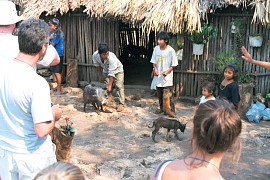 After visiting Coba we traveled to the electricity-less Mayan village
named Campamento Hidalgo. We stopped here at this house because the
occupants like to show their house off to visitors. The husband shows
off a boar, while a son has a wild raccoon on a leash. There are also
a few daughters in the picture. This family has 14 children, and when
we visited the mother was about to have another child.
After visiting Coba we traveled to the electricity-less Mayan village
named Campamento Hidalgo. We stopped here at this house because the
occupants like to show their house off to visitors. The husband shows
off a boar, while a son has a wild raccoon on a leash. There are also
a few daughters in the picture. This family has 14 children, and when
we visited the mother was about to have another child.
|
| |
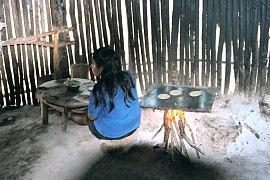 It is in Miriam the tour guides best interest
to develop relationships with the Mayans in whose area she brings her
tourist groups. I don't see anything phoney or dishonest in this. It
is apparent that Miriam likes and respects the Mayans very much. All
eight or so sisters in this family have the same first name - Maria -
with their middle name used to distinguish them. This Maria has the
domestic job of making 400 corn tortias per day.
It is in Miriam the tour guides best interest
to develop relationships with the Mayans in whose area she brings her
tourist groups. I don't see anything phoney or dishonest in this. It
is apparent that Miriam likes and respects the Mayans very much. All
eight or so sisters in this family have the same first name - Maria -
with their middle name used to distinguish them. This Maria has the
domestic job of making 400 corn tortias per day.
|
| |
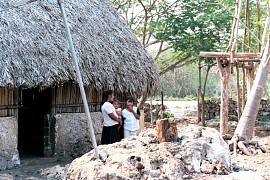 Here an older sister looks after her younger siblings. The modern Mayas
are farmers and hunters. The fields are located a mile from here. The
government gives the men shotguns and ammunition to hunt in the jungle.
Miriam says they
have no use for money and just grow what they can use or grow just a little
extra for something they want, like gold and silver for their teeth. The
whole family sleeps in hammocks in this small hut - two to a hammock.
Here an older sister looks after her younger siblings. The modern Mayas
are farmers and hunters. The fields are located a mile from here. The
government gives the men shotguns and ammunition to hunt in the jungle.
Miriam says they
have no use for money and just grow what they can use or grow just a little
extra for something they want, like gold and silver for their teeth. The
whole family sleeps in hammocks in this small hut - two to a hammock.
|
| |
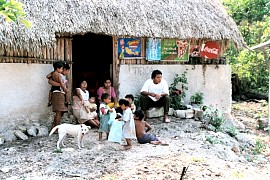 We are back in the bus and travelling to the wildlife area where the
spider monkeys live. Here are some folks sitting outside a small
store along the road.
We are back in the bus and travelling to the wildlife area where the
spider monkeys live. Here are some folks sitting outside a small
store along the road.
|
| |
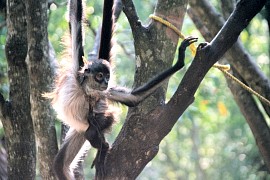 Now we have reached the village of Punta Laguna where a protected wildlife
area for spider monkeys is located. This spider monkey was raised by
humans because her parents were killed. If she had been released to the
wild the truly wild monkeys would kill her. The hope is that tethered
outside like she is she will become pregnant, then when she has a baby
monkey in tow the wild monkeys will accept her.
Now we have reached the village of Punta Laguna where a protected wildlife
area for spider monkeys is located. This spider monkey was raised by
humans because her parents were killed. If she had been released to the
wild the truly wild monkeys would kill her. The hope is that tethered
outside like she is she will become pregnant, then when she has a baby
monkey in tow the wild monkeys will accept her.
|
| |
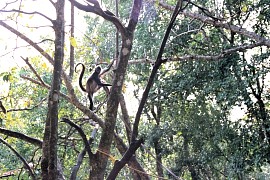 Another shot of the tethered monkey. I marvel at the long skinny arms,
legs, and tails.
Another shot of the tethered monkey. I marvel at the long skinny arms,
legs, and tails.
|
| |
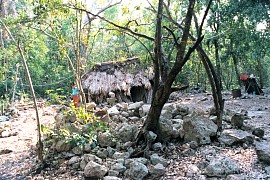 One family lives here next to the entrance to the nature preserve.
According to Miriam, the grandparents are well over 100 years old. She
said the Mayans often reach extreme old age.
One family lives here next to the entrance to the nature preserve.
According to Miriam, the grandparents are well over 100 years old. She
said the Mayans often reach extreme old age.
|
| |
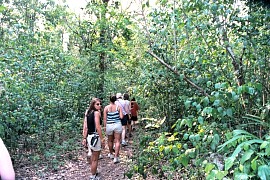 We start our short trek into the jungle. Our guide is Juan or "Johnny".
We start our short trek into the jungle. Our guide is Juan or "Johnny".
|
| |
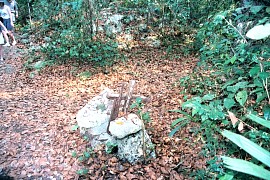 I asked Miriam about this cross in the jungle. I thought maybe it was
a grave. She said no, that it was literally an alter here in the jungle
for religious purposes. The Mayans apparently mix notions of their
ancient gods with todays Christianity. The Rain God is very big around
here. There had been an unusual "bloody moon" lately. Miriam asked the
older Mayans what it meant. "Either a war will start, or we will have
rain". Indeed, we invaded Iraq on Monday of this week.
I asked Miriam about this cross in the jungle. I thought maybe it was
a grave. She said no, that it was literally an alter here in the jungle
for religious purposes. The Mayans apparently mix notions of their
ancient gods with todays Christianity. The Rain God is very big around
here. There had been an unusual "bloody moon" lately. Miriam asked the
older Mayans what it meant. "Either a war will start, or we will have
rain". Indeed, we invaded Iraq on Monday of this week.
|
| |
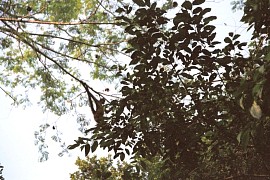 Here we see the first wild spider monkey.
Here we see the first wild spider monkey.
|









